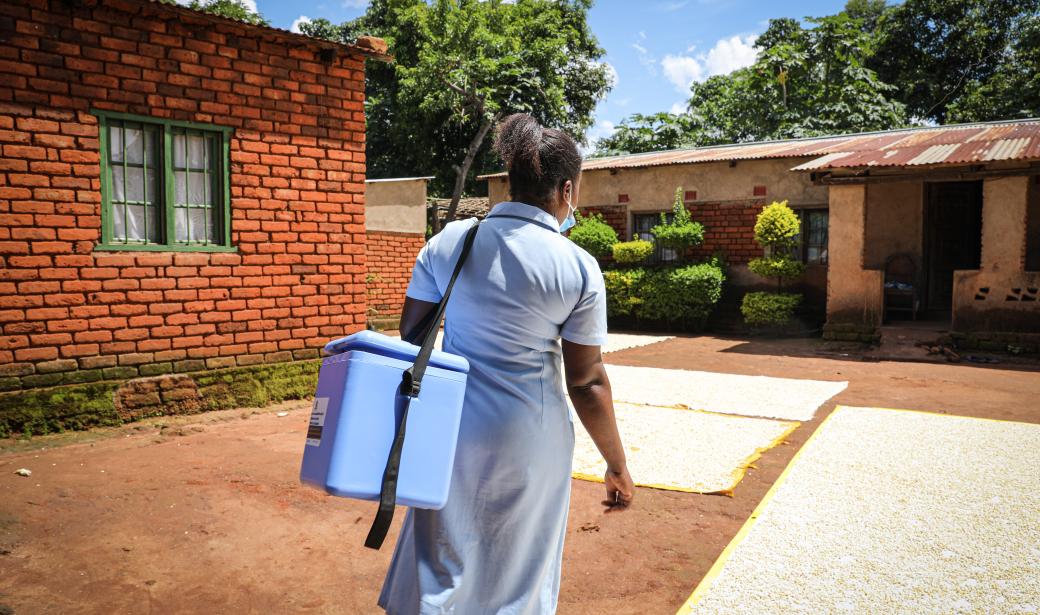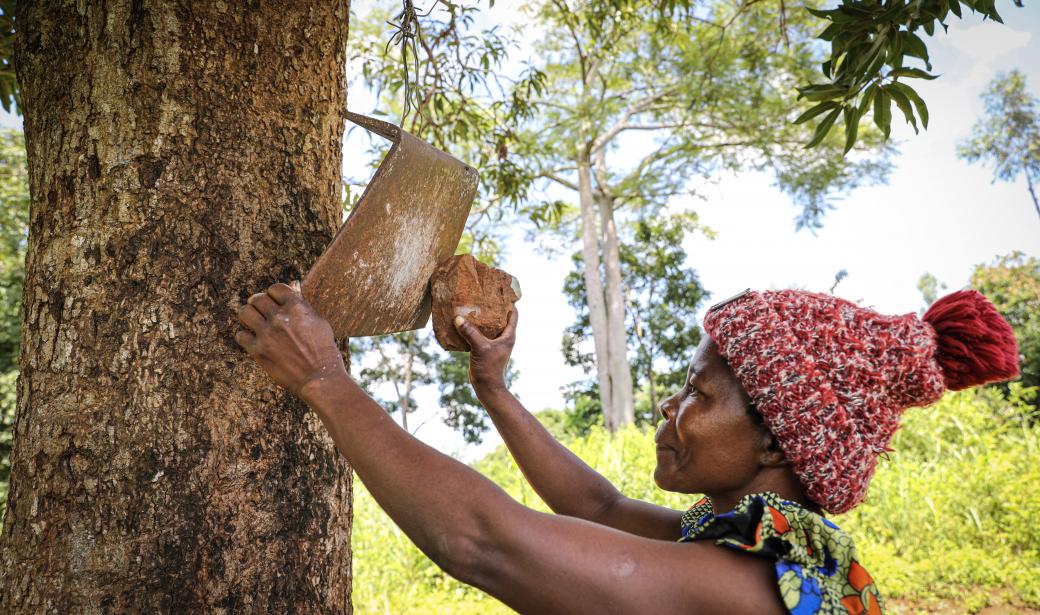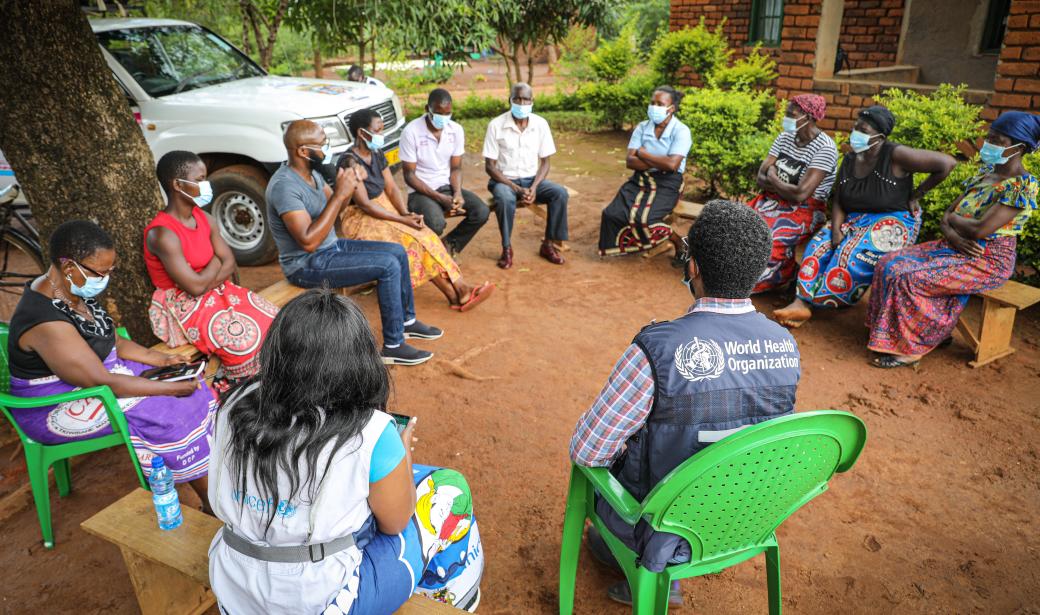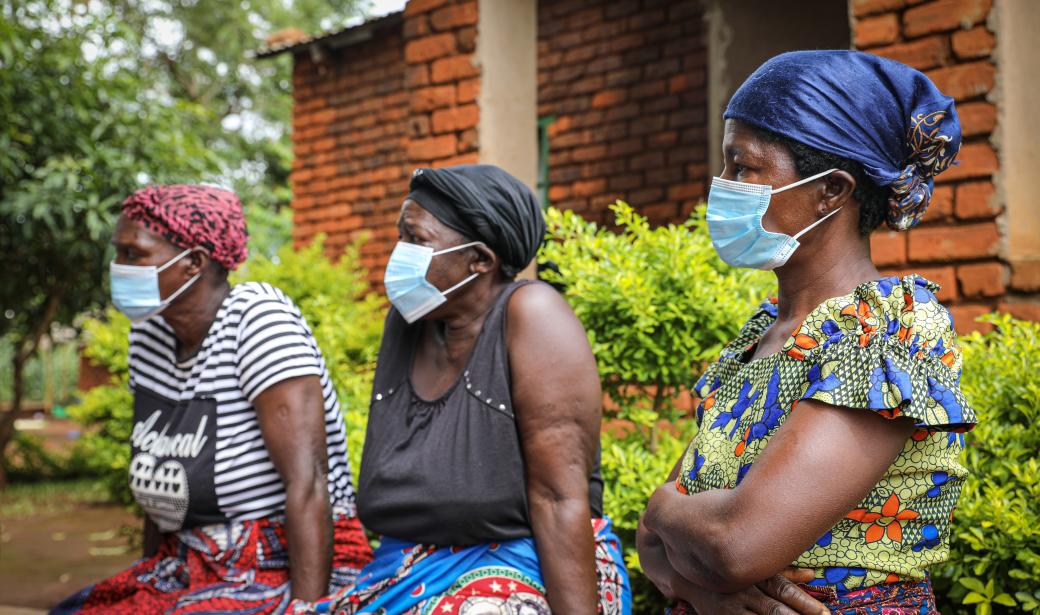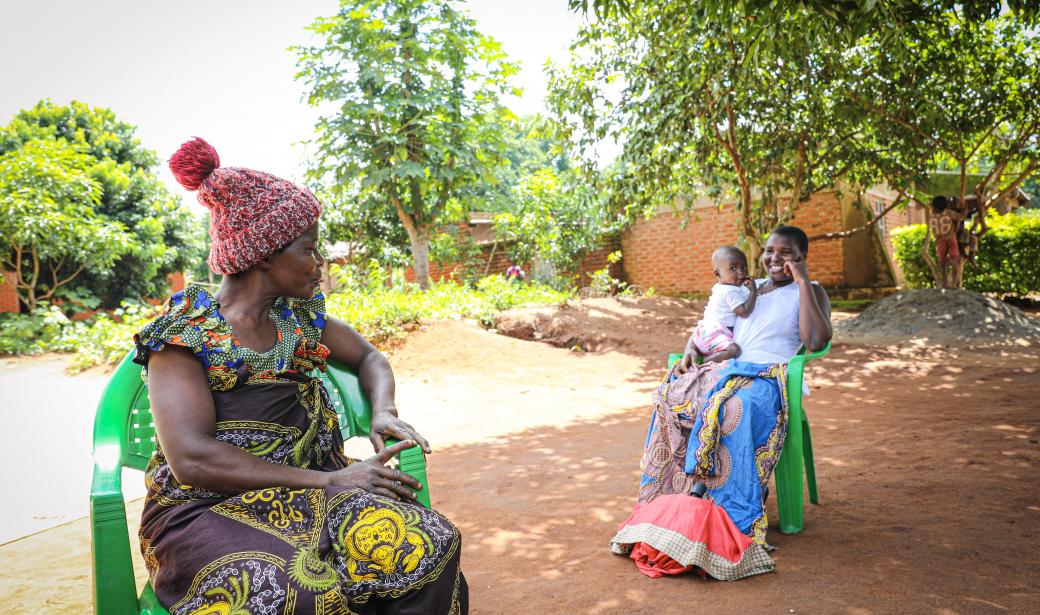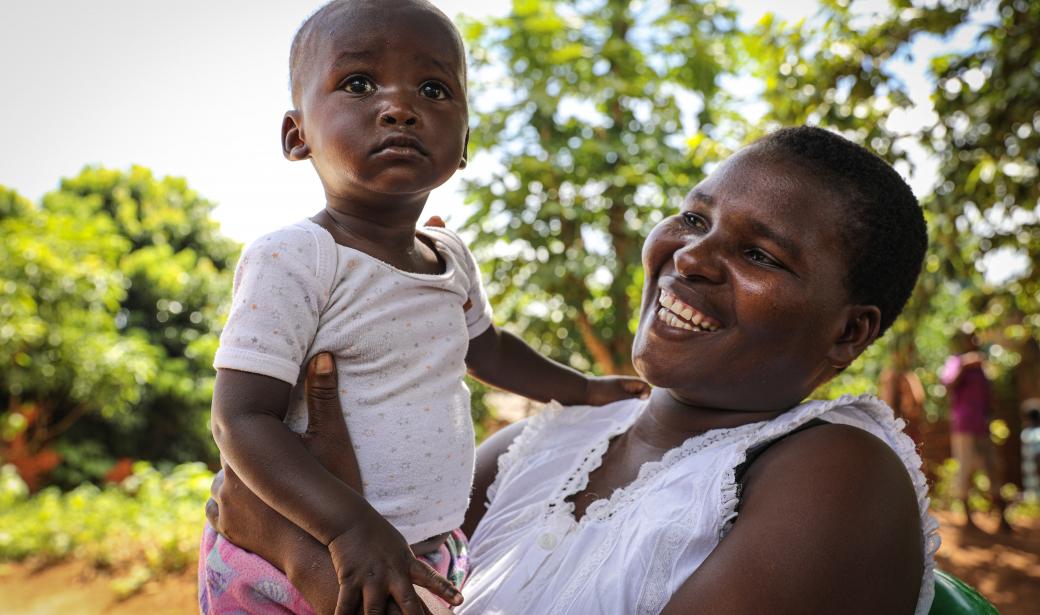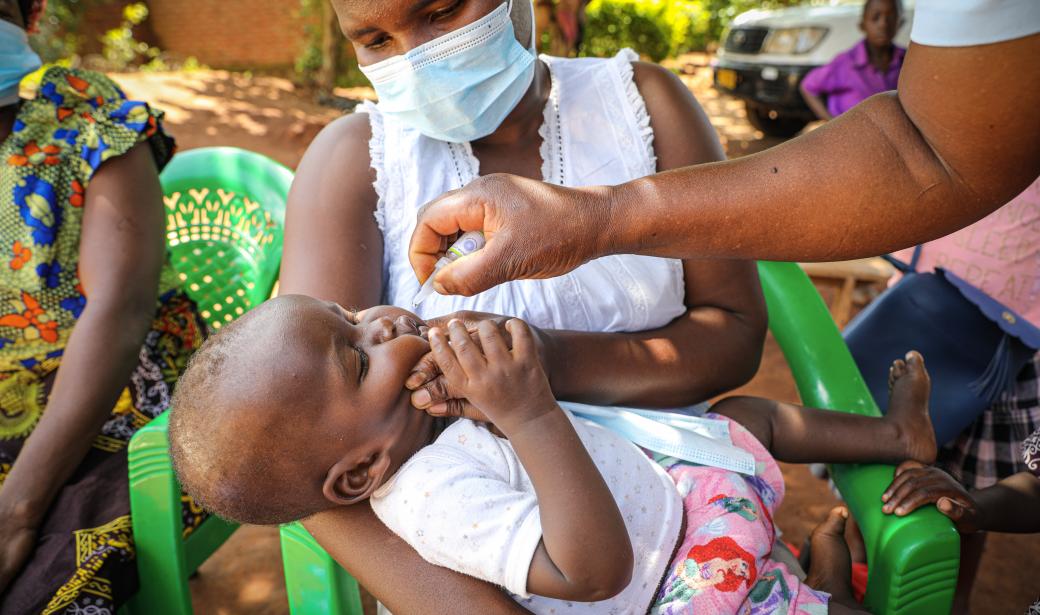WHO/Marta Villa Monge
“I found families refusing to get their children vaccinated against polio for several reasons, and the main one was the confusion driven by the COVID-19 pandemic and the misinformation around it”.
Mercy Uledi, a vaccinator trained by WHO, quickly alerted her supervisor on the worrying number of families refusing to get the polio vaccine in Namazoma village (Mulanje district, Malawi). The notification was received and analyzed by independent monitors, together with district health authorities and partners during the daily supplementary immunization activities (SIAs) meeting. Immediately after the evaluation, a dedicated team was established from the social mobilization committee, including UNICEF and WHO technical members.
Vaccinators like Mercy know about the need to quickly address misinformation and ensure adherence to the campaign, as Malawi aims to vaccinate 2.9 million children nationwide. This would be done in four ongoing vaccination rounds following the declaration of a polio outbreak by H.E. President of Malawi, Lazarus Chakwera, after the confirmation of a wild poliovirus case near the Capital, Lilongwe, in February.
Aside from COVID-19, national concerns are focused also on the Southern Region of the country, as per the increasing cholera cases following the floods caused by tropical storm Anna and cyclone Gombe.
Mercy Uledi, a vaccinator trained by WHO, quickly alerted her supervisor on the worrying number of families refusing to get the polio vaccine in Namazoma village (Mulanje district, Malawi). The notification was received and analyzed by independent monitors, together with district health authorities and partners during the daily supplementary immunization activities (SIAs) meeting. Immediately after the evaluation, a dedicated team was established from the social mobilization committee, including UNICEF and WHO technical members.
Vaccinators like Mercy know about the need to quickly address misinformation and ensure adherence to the campaign, as Malawi aims to vaccinate 2.9 million children nationwide. This would be done in four ongoing vaccination rounds following the declaration of a polio outbreak by H.E. President of Malawi, Lazarus Chakwera, after the confirmation of a wild poliovirus case near the Capital, Lilongwe, in February.
Aside from COVID-19, national concerns are focused also on the Southern Region of the country, as per the increasing cholera cases following the floods caused by tropical storm Anna and cyclone Gombe.
“This could easily be a new drinkable COVID-19 vaccine that you want to administer to my child, how would I know?”. This was one of the concerns shared by several mothers in Namazoma, and it also reached the ears of Fane Nandolo, mother of Odala Phiri and Happiness Mark, both eligible for polio vaccination.
At that point, vaccination refusal was at 50%, as 46 households had rejected the vaccine on Monday. Subsequent awareness was provided by the district health promotion officer, Mr Chipiliro Mjojo, in local language, Chichewa, with support from Elsie Chitedze (UNICEF Malawi programme associate in health) and Fitwi Meles (WHO Stop Transmission of Polio consultant) to ensure a successful vaccination roll out in the community. “It’s critical for leaders to understand why this campaign is going on, so that the message can be easily trickled down to the community, as people will listen to their traditional leaders first” – affirmed both, Elsie and Fitwi.
After a long debate, all questions were addressed: “There is no drinkable vaccine against COVID-19; this is the polio vaccine and we are only administering it among children under 5, who are at risk of getting paralysis due to the poliovirus. All we want is to protect our children”.
Another concern was raised around the indelible ink, as children get a small mark in their fingers to prove their vaccination status with a finger marker. Leaders asked about the reason behind that mark on behalf of the mothers in the community: “Why are you then marking every child with your pens? Mothers are worried about potential stigma or evil presence around their houses if their kids get marked”. To that, Mr Chipiliro Mjojo, replied: “This is just to make a simple distinction among the children who got the vaccine so that they do not get it twice. It’s similar in the national elections: you vote and you get marked in your finger so that you do not get to vote twice”.
After a long debate, all questions were addressed: “There is no drinkable vaccine against COVID-19; this is the polio vaccine and we are only administering it among children under 5, who are at risk of getting paralysis due to the poliovirus. All we want is to protect our children”.
Another concern was raised around the indelible ink, as children get a small mark in their fingers to prove their vaccination status with a finger marker. Leaders asked about the reason behind that mark on behalf of the mothers in the community: “Why are you then marking every child with your pens? Mothers are worried about potential stigma or evil presence around their houses if their kids get marked”. To that, Mr Chipiliro Mjojo, replied: “This is just to make a simple distinction among the children who got the vaccine so that they do not get it twice. It’s similar in the national elections: you vote and you get marked in your finger so that you do not get to vote twice”.
Neli Chimenya, as the village chief, was cautiously listening to every single explanation health experts were providing so that when mothers found her around in the market or near the church, she could have the right answers. She affirmed to the team: “come back tomorrow, as by then I would have talked to most mothers here. It would be fine, no worries”.
Neli then gathered families in the community privately and informed them on the need to get the kids vaccinated the following day, when the vaccinator came back.
The district social mobilization team also remained in the village to further observe the house to house vaccination and to mobilize using the mobile van the following day.
The district social mobilization team also remained in the village to further observe the house to house vaccination and to mobilize using the mobile van the following day.
The outcome of that community engagement was clear on Wednesday: out of the 46 households who refused, 25 got the vaccine the following day, and those who did not it was because they were not at home when the vaccinator visited them. The acceptance went to 100% after the engagement and the remaining kids were vaccinated on Thursday, including Odala Phiri and Happiness Mark, under the supervision of a smiling and now relaxed mother, and a proud community leader like Neli.
Independent polio campaign monitoring is yet another tool which contributes to documentating and understanding the reasons for vaccine refusals, including misinformation around different health topics. The findings of independent monitors are critical for guiding any necessary mid-course corrections if gaps or problems are found in supplementary immunization activities and to adopt online and offline initiatives to counter the spread of dangerous rumours.
For Additional Information or to Request Interviews, Please contact:
Monge Marta Villa
Communications Officer
Polio Eradication Programme
WHO Regional Office for Africa
Email: mongem [at] who.int
Tel: + 34 636 04 76 79




